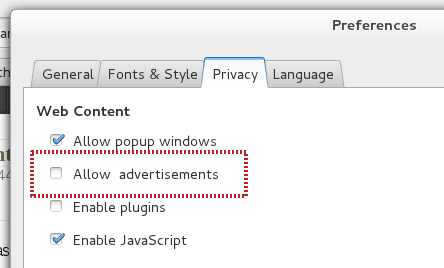AdBlock, integrated
For a long time our adblock story was a bit underwhelming. We had an extension to do the job, but it was buggy and it would often either not block what it had to block or block just way too much (like, the entire page). So in the last cycle we pretty much rewrote the extension from scratch: it just works better, blocks what it has to block, and uses the adblock+ source filter files.
We just felt this was not enough though. Lots of people still found the wrong extension version, or were not aware there was an extension in the first place, so their experience was not as good as we hoped. So for 3.8 we are just going to bite the bullet, and integrate adblock into the browser itself. Last week we took the extension, merged it into Web, cleaned the the heck out of it, and added a simple entry point in our preferences to control it:
Of course there’s still some things that could be done, like a simple UI to edit the filter rules (for instance, to white-list a particular page where you do want to see ads), but for now we feel this is already a good improvement.
Boston Summit
In other news, I’m just a couple days away from jumping into a plane to attend this year’s Boston Summit. I’m looking forward to see old and new faces and continue the good discussions and work we started in GUADEC about the present and future of GNOME. On the selfish department, I hope to get hold of some lost designer to start fleshing out the 3.8 plans for Web, there’s so much to do.
Thanks to the GNOME Foundation for sponsoring my trip, and to Igalia for allowing me to attend the event!



Thanks very much for merging adblock into the core of epiphany!
Ads are annoying but not that much. On the other hand, flash is really troublesome.
So I love that chromium allows the possibility to disable plugins and then allows to click on placeholders to run them as-needed and to enter a whitelist.
I hope this won’t be enabled by default, though?
@Dag: no, it isn’t.
I think the root of the problem here is how extensions work in Epiphany. Sure, this fixes the problem for AdBlock, but what about the other ones? By just merging popular extensions you could end up with a bloated mess like Firefox and Chrome have become.
extensions.gnome.org works beautifully for the Shell but I assume something like that would be much harder for Epiphany, where extensions are written in C.
A more feasible possibility would be to distribute the extensions with the epiphany tarball, but still keep them separate from the program just as they are now. Or at least bundle the more popular and well written extensions, and rename epiphany-extensions to epiphany-extensions-extras. This would ensure users have the extensions available and ready to use in any system where Epiphany is actually installed, and that they were built against the correct Epiphany version.
Anyway, just some thoughts. I love Epiphany, the 3.6 release is rocking!
Awesome. 🙂 Now the only thing I’m missing would be a working plugin that does not run flash on default to avoid crashes. I’m look forward to use 3.6/8!
@Dag: I would have hoped the contrary.
But thatnk you very much Xan for merging it into Epiphany!
Awesome!
That makes me think, when Epiphany gets flash support, would be nice to have a “click to play” feature available there too. Most of the flash content on the web is crap you don’t want to see (like random videos that autoplay and eat your CPU), but sometimes you run into corners where you really do need Flash on a per-case basis.
This may be the best way I’ve ever seen of handling AdBlock. >_>
And here I’d hoped that the unchecked “allow advertisements” in the screenshot indicated the default setting. Why not? Not like Web has to seriously worry about impacting the web quite yet; might as well take a tactical advantage and remove ads by default.
@bochecha: I can see why you’d want that, but I think ad-blocking should be opt-in for a number of reasons. There are many websites that rely on advertisements for revenue, without being assholes about it (e.g. reddit seems to qualify). If web browsers start to block advertisements by default, such websites would no longer be possible and would have to convert to a paid premium account model. Also, I fear that websites and advertisers that are less nice about it would start to make more of an effort to circumvent adblockers, just like how spammers try hard to circumvent spam filters. Currently, adblocking works well because there’s little to no resistence; advertisers aren’t making it hard to block them. Last, no adblocking is perfect and there’s always going to be false positives that are blocked but aren’t actual advertising. I’ve seen websites break when using adblock in Firefox, so enabling it should be a concious decision and preferably it should also be easy to disable it temporarily or for individual websites.
It’s great that Epiphany is making it easy to opt in, though.